Two Major Themes of Their Eyes Were Watching God
VerifiedAdded on 2023/06/11
|7
|1800
|451
AI Summary
This essay discusses the major themes of Zora Neale Hurston's novel Their Eyes Were Watching God, including gender roles and racial discrimination. The essay analyzes the character evolution of Janie Crawford and her transformation from a vulnerable teenager to a woman who can influence her own destiny. The essay also highlights the importance of women in any relationship and the effect of race and racial discrimination in the novel.
Contribute Materials
Your contribution can guide someone’s learning journey. Share your
documents today.
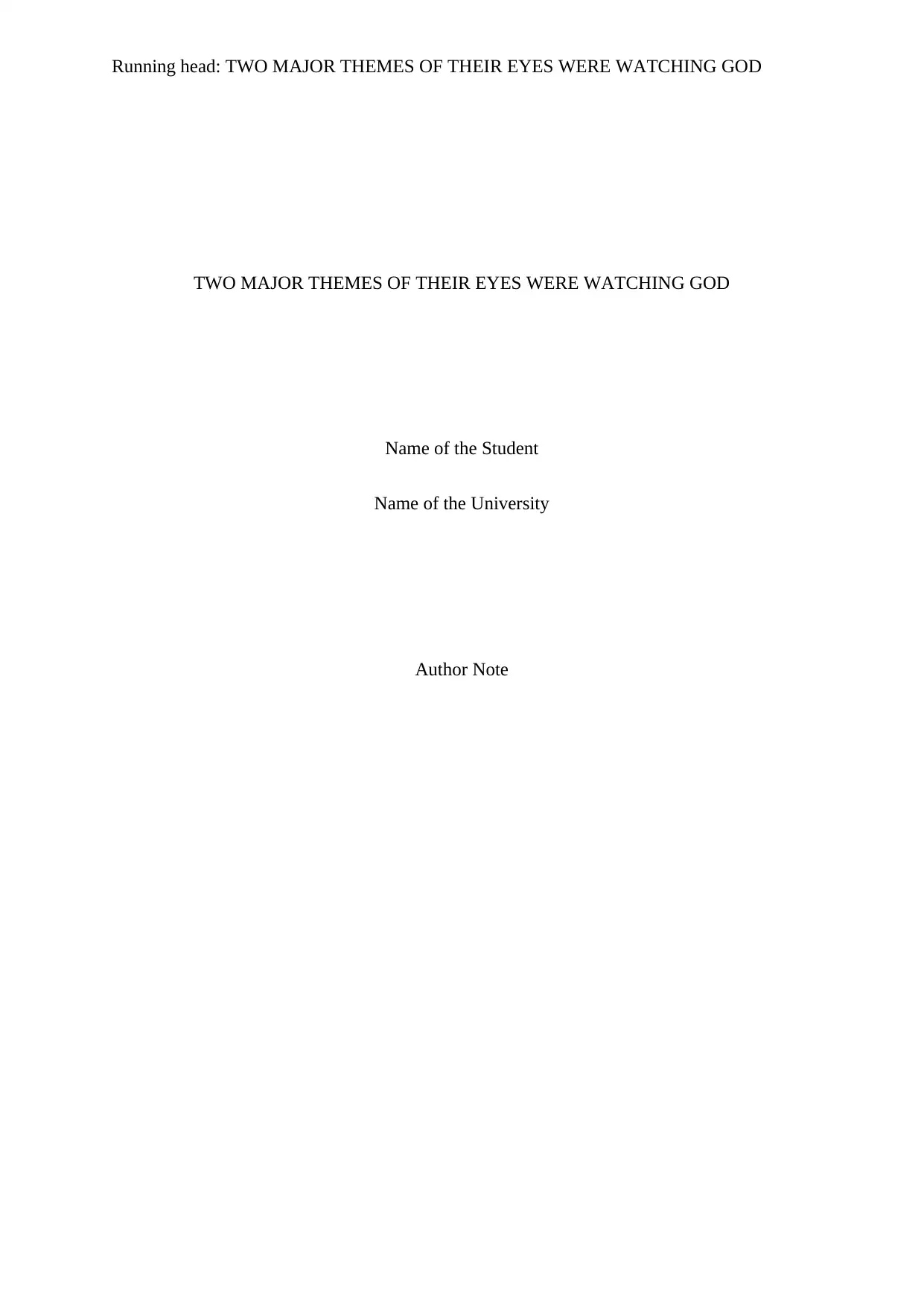
Running head: TWO MAJOR THEMES OF THEIR EYES WERE WATCHING GOD
TWO MAJOR THEMES OF THEIR EYES WERE WATCHING GOD
Name of the Student
Name of the University
Author Note
TWO MAJOR THEMES OF THEIR EYES WERE WATCHING GOD
Name of the Student
Name of the University
Author Note
Secure Best Marks with AI Grader
Need help grading? Try our AI Grader for instant feedback on your assignments.
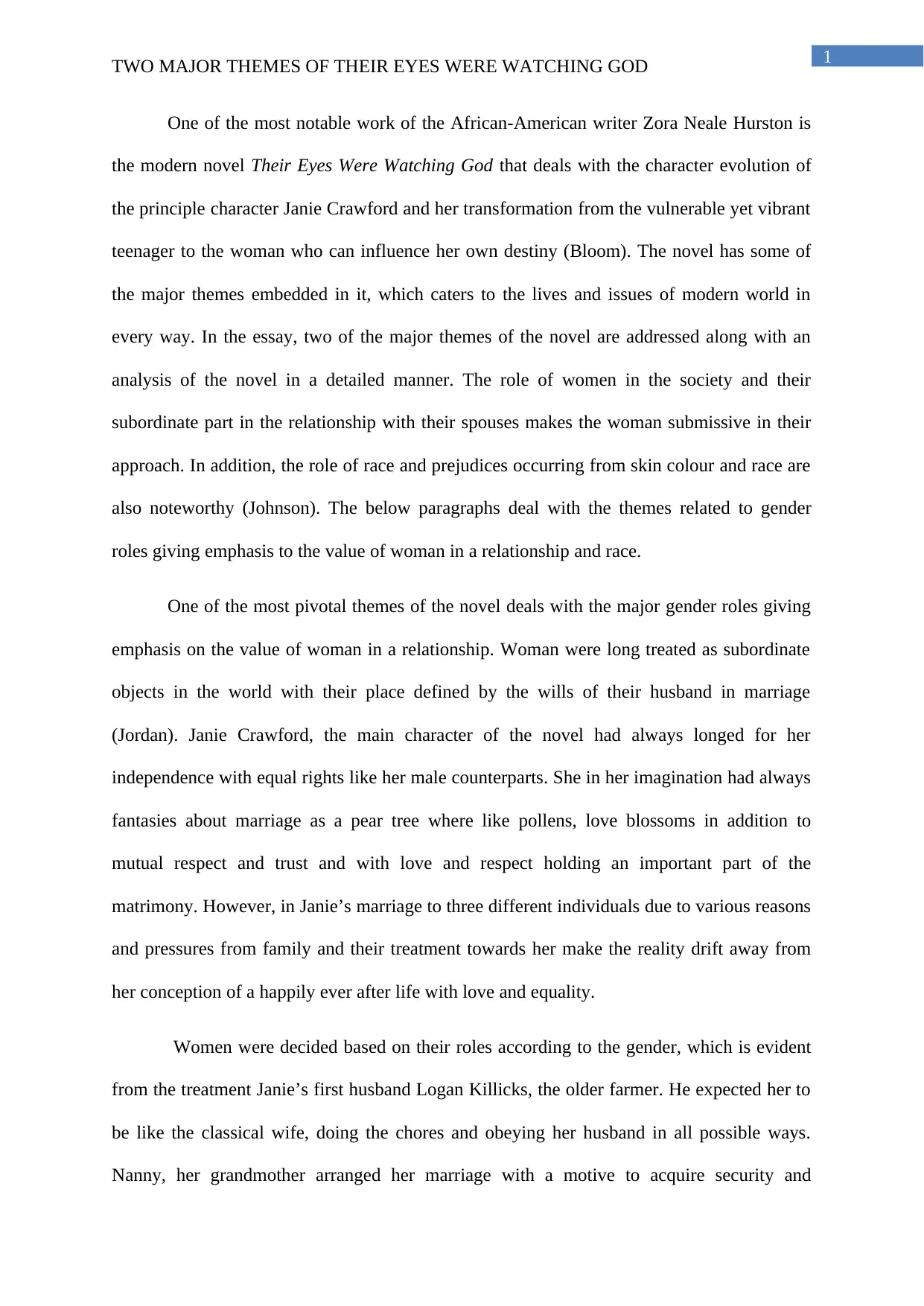
1
TWO MAJOR THEMES OF THEIR EYES WERE WATCHING GOD
One of the most notable work of the African-American writer Zora Neale Hurston is
the modern novel Their Eyes Were Watching God that deals with the character evolution of
the principle character Janie Crawford and her transformation from the vulnerable yet vibrant
teenager to the woman who can influence her own destiny (Bloom). The novel has some of
the major themes embedded in it, which caters to the lives and issues of modern world in
every way. In the essay, two of the major themes of the novel are addressed along with an
analysis of the novel in a detailed manner. The role of women in the society and their
subordinate part in the relationship with their spouses makes the woman submissive in their
approach. In addition, the role of race and prejudices occurring from skin colour and race are
also noteworthy (Johnson). The below paragraphs deal with the themes related to gender
roles giving emphasis to the value of woman in a relationship and race.
One of the most pivotal themes of the novel deals with the major gender roles giving
emphasis on the value of woman in a relationship. Woman were long treated as subordinate
objects in the world with their place defined by the wills of their husband in marriage
(Jordan). Janie Crawford, the main character of the novel had always longed for her
independence with equal rights like her male counterparts. She in her imagination had always
fantasies about marriage as a pear tree where like pollens, love blossoms in addition to
mutual respect and trust and with love and respect holding an important part of the
matrimony. However, in Janie’s marriage to three different individuals due to various reasons
and pressures from family and their treatment towards her make the reality drift away from
her conception of a happily ever after life with love and equality.
Women were decided based on their roles according to the gender, which is evident
from the treatment Janie’s first husband Logan Killicks, the older farmer. He expected her to
be like the classical wife, doing the chores and obeying her husband in all possible ways.
Nanny, her grandmother arranged her marriage with a motive to acquire security and
TWO MAJOR THEMES OF THEIR EYES WERE WATCHING GOD
One of the most notable work of the African-American writer Zora Neale Hurston is
the modern novel Their Eyes Were Watching God that deals with the character evolution of
the principle character Janie Crawford and her transformation from the vulnerable yet vibrant
teenager to the woman who can influence her own destiny (Bloom). The novel has some of
the major themes embedded in it, which caters to the lives and issues of modern world in
every way. In the essay, two of the major themes of the novel are addressed along with an
analysis of the novel in a detailed manner. The role of women in the society and their
subordinate part in the relationship with their spouses makes the woman submissive in their
approach. In addition, the role of race and prejudices occurring from skin colour and race are
also noteworthy (Johnson). The below paragraphs deal with the themes related to gender
roles giving emphasis to the value of woman in a relationship and race.
One of the most pivotal themes of the novel deals with the major gender roles giving
emphasis on the value of woman in a relationship. Woman were long treated as subordinate
objects in the world with their place defined by the wills of their husband in marriage
(Jordan). Janie Crawford, the main character of the novel had always longed for her
independence with equal rights like her male counterparts. She in her imagination had always
fantasies about marriage as a pear tree where like pollens, love blossoms in addition to
mutual respect and trust and with love and respect holding an important part of the
matrimony. However, in Janie’s marriage to three different individuals due to various reasons
and pressures from family and their treatment towards her make the reality drift away from
her conception of a happily ever after life with love and equality.
Women were decided based on their roles according to the gender, which is evident
from the treatment Janie’s first husband Logan Killicks, the older farmer. He expected her to
be like the classical wife, doing the chores and obeying her husband in all possible ways.
Nanny, her grandmother arranged her marriage with a motive to acquire security and
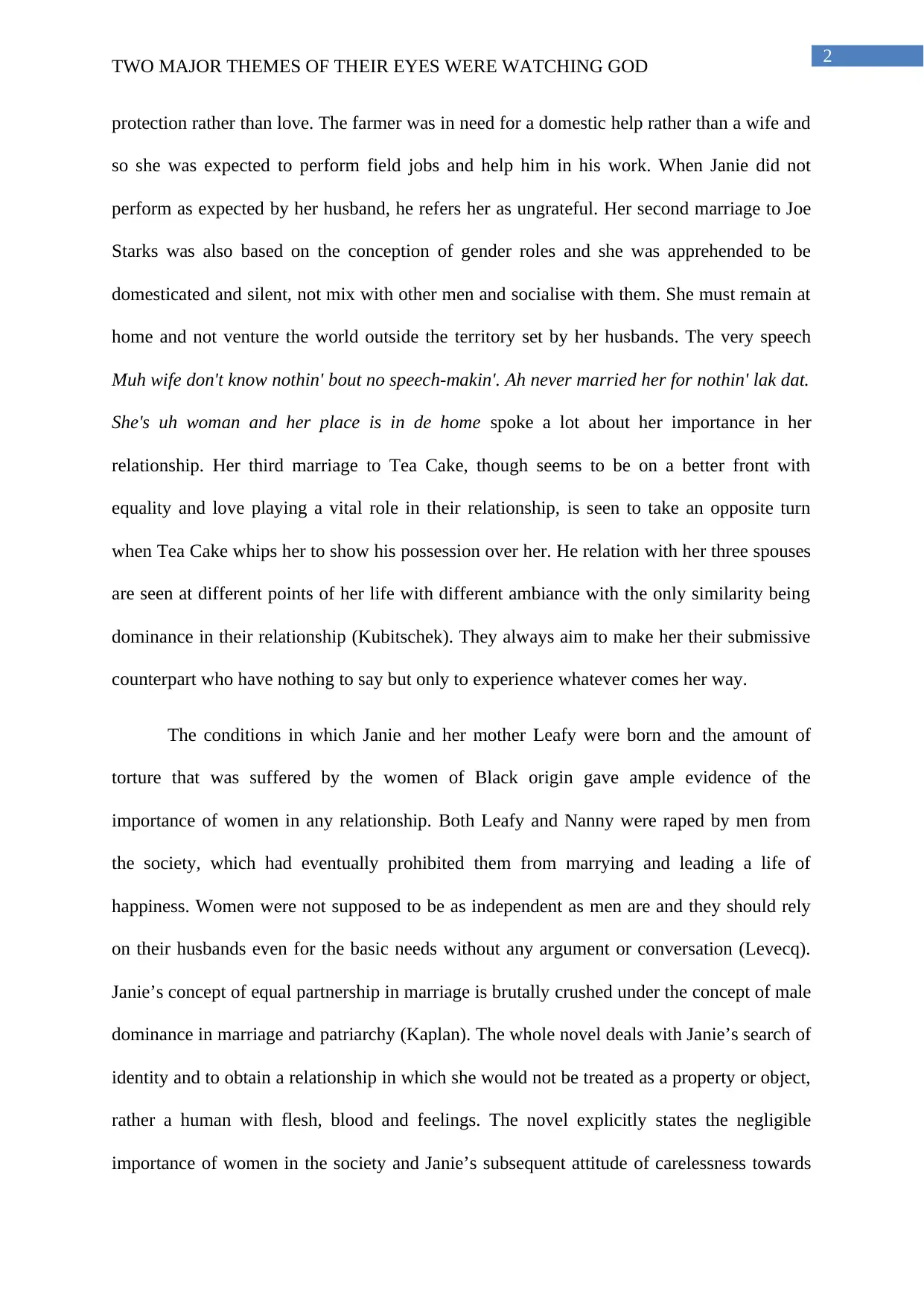
2
TWO MAJOR THEMES OF THEIR EYES WERE WATCHING GOD
protection rather than love. The farmer was in need for a domestic help rather than a wife and
so she was expected to perform field jobs and help him in his work. When Janie did not
perform as expected by her husband, he refers her as ungrateful. Her second marriage to Joe
Starks was also based on the conception of gender roles and she was apprehended to be
domesticated and silent, not mix with other men and socialise with them. She must remain at
home and not venture the world outside the territory set by her husbands. The very speech
Muh wife don't know nothin' bout no speech-makin'. Ah never married her for nothin' lak dat.
She's uh woman and her place is in de home spoke a lot about her importance in her
relationship. Her third marriage to Tea Cake, though seems to be on a better front with
equality and love playing a vital role in their relationship, is seen to take an opposite turn
when Tea Cake whips her to show his possession over her. He relation with her three spouses
are seen at different points of her life with different ambiance with the only similarity being
dominance in their relationship (Kubitschek). They always aim to make her their submissive
counterpart who have nothing to say but only to experience whatever comes her way.
The conditions in which Janie and her mother Leafy were born and the amount of
torture that was suffered by the women of Black origin gave ample evidence of the
importance of women in any relationship. Both Leafy and Nanny were raped by men from
the society, which had eventually prohibited them from marrying and leading a life of
happiness. Women were not supposed to be as independent as men are and they should rely
on their husbands even for the basic needs without any argument or conversation (Levecq).
Janie’s concept of equal partnership in marriage is brutally crushed under the concept of male
dominance in marriage and patriarchy (Kaplan). The whole novel deals with Janie’s search of
identity and to obtain a relationship in which she would not be treated as a property or object,
rather a human with flesh, blood and feelings. The novel explicitly states the negligible
importance of women in the society and Janie’s subsequent attitude of carelessness towards
TWO MAJOR THEMES OF THEIR EYES WERE WATCHING GOD
protection rather than love. The farmer was in need for a domestic help rather than a wife and
so she was expected to perform field jobs and help him in his work. When Janie did not
perform as expected by her husband, he refers her as ungrateful. Her second marriage to Joe
Starks was also based on the conception of gender roles and she was apprehended to be
domesticated and silent, not mix with other men and socialise with them. She must remain at
home and not venture the world outside the territory set by her husbands. The very speech
Muh wife don't know nothin' bout no speech-makin'. Ah never married her for nothin' lak dat.
She's uh woman and her place is in de home spoke a lot about her importance in her
relationship. Her third marriage to Tea Cake, though seems to be on a better front with
equality and love playing a vital role in their relationship, is seen to take an opposite turn
when Tea Cake whips her to show his possession over her. He relation with her three spouses
are seen at different points of her life with different ambiance with the only similarity being
dominance in their relationship (Kubitschek). They always aim to make her their submissive
counterpart who have nothing to say but only to experience whatever comes her way.
The conditions in which Janie and her mother Leafy were born and the amount of
torture that was suffered by the women of Black origin gave ample evidence of the
importance of women in any relationship. Both Leafy and Nanny were raped by men from
the society, which had eventually prohibited them from marrying and leading a life of
happiness. Women were not supposed to be as independent as men are and they should rely
on their husbands even for the basic needs without any argument or conversation (Levecq).
Janie’s concept of equal partnership in marriage is brutally crushed under the concept of male
dominance in marriage and patriarchy (Kaplan). The whole novel deals with Janie’s search of
identity and to obtain a relationship in which she would not be treated as a property or object,
rather a human with flesh, blood and feelings. The novel explicitly states the negligible
importance of women in the society and Janie’s subsequent attitude of carelessness towards
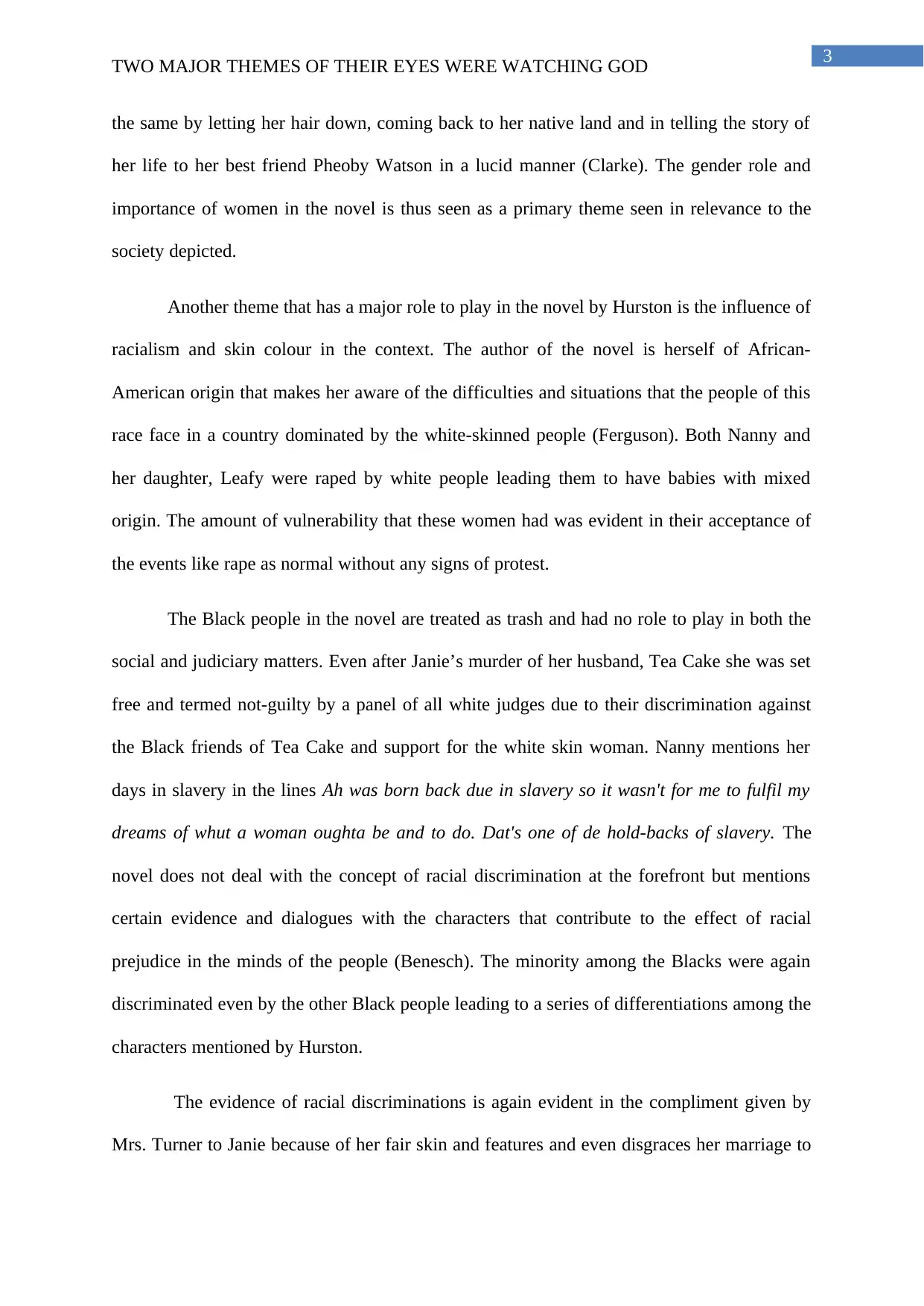
3
TWO MAJOR THEMES OF THEIR EYES WERE WATCHING GOD
the same by letting her hair down, coming back to her native land and in telling the story of
her life to her best friend Pheoby Watson in a lucid manner (Clarke). The gender role and
importance of women in the novel is thus seen as a primary theme seen in relevance to the
society depicted.
Another theme that has a major role to play in the novel by Hurston is the influence of
racialism and skin colour in the context. The author of the novel is herself of African-
American origin that makes her aware of the difficulties and situations that the people of this
race face in a country dominated by the white-skinned people (Ferguson). Both Nanny and
her daughter, Leafy were raped by white people leading them to have babies with mixed
origin. The amount of vulnerability that these women had was evident in their acceptance of
the events like rape as normal without any signs of protest.
The Black people in the novel are treated as trash and had no role to play in both the
social and judiciary matters. Even after Janie’s murder of her husband, Tea Cake she was set
free and termed not-guilty by a panel of all white judges due to their discrimination against
the Black friends of Tea Cake and support for the white skin woman. Nanny mentions her
days in slavery in the lines Ah was born back due in slavery so it wasn't for me to fulfil my
dreams of whut a woman oughta be and to do. Dat's one of de hold-backs of slavery. The
novel does not deal with the concept of racial discrimination at the forefront but mentions
certain evidence and dialogues with the characters that contribute to the effect of racial
prejudice in the minds of the people (Benesch). The minority among the Blacks were again
discriminated even by the other Black people leading to a series of differentiations among the
characters mentioned by Hurston.
The evidence of racial discriminations is again evident in the compliment given by
Mrs. Turner to Janie because of her fair skin and features and even disgraces her marriage to
TWO MAJOR THEMES OF THEIR EYES WERE WATCHING GOD
the same by letting her hair down, coming back to her native land and in telling the story of
her life to her best friend Pheoby Watson in a lucid manner (Clarke). The gender role and
importance of women in the novel is thus seen as a primary theme seen in relevance to the
society depicted.
Another theme that has a major role to play in the novel by Hurston is the influence of
racialism and skin colour in the context. The author of the novel is herself of African-
American origin that makes her aware of the difficulties and situations that the people of this
race face in a country dominated by the white-skinned people (Ferguson). Both Nanny and
her daughter, Leafy were raped by white people leading them to have babies with mixed
origin. The amount of vulnerability that these women had was evident in their acceptance of
the events like rape as normal without any signs of protest.
The Black people in the novel are treated as trash and had no role to play in both the
social and judiciary matters. Even after Janie’s murder of her husband, Tea Cake she was set
free and termed not-guilty by a panel of all white judges due to their discrimination against
the Black friends of Tea Cake and support for the white skin woman. Nanny mentions her
days in slavery in the lines Ah was born back due in slavery so it wasn't for me to fulfil my
dreams of whut a woman oughta be and to do. Dat's one of de hold-backs of slavery. The
novel does not deal with the concept of racial discrimination at the forefront but mentions
certain evidence and dialogues with the characters that contribute to the effect of racial
prejudice in the minds of the people (Benesch). The minority among the Blacks were again
discriminated even by the other Black people leading to a series of differentiations among the
characters mentioned by Hurston.
The evidence of racial discriminations is again evident in the compliment given by
Mrs. Turner to Janie because of her fair skin and features and even disgraces her marriage to
Secure Best Marks with AI Grader
Need help grading? Try our AI Grader for instant feedback on your assignments.
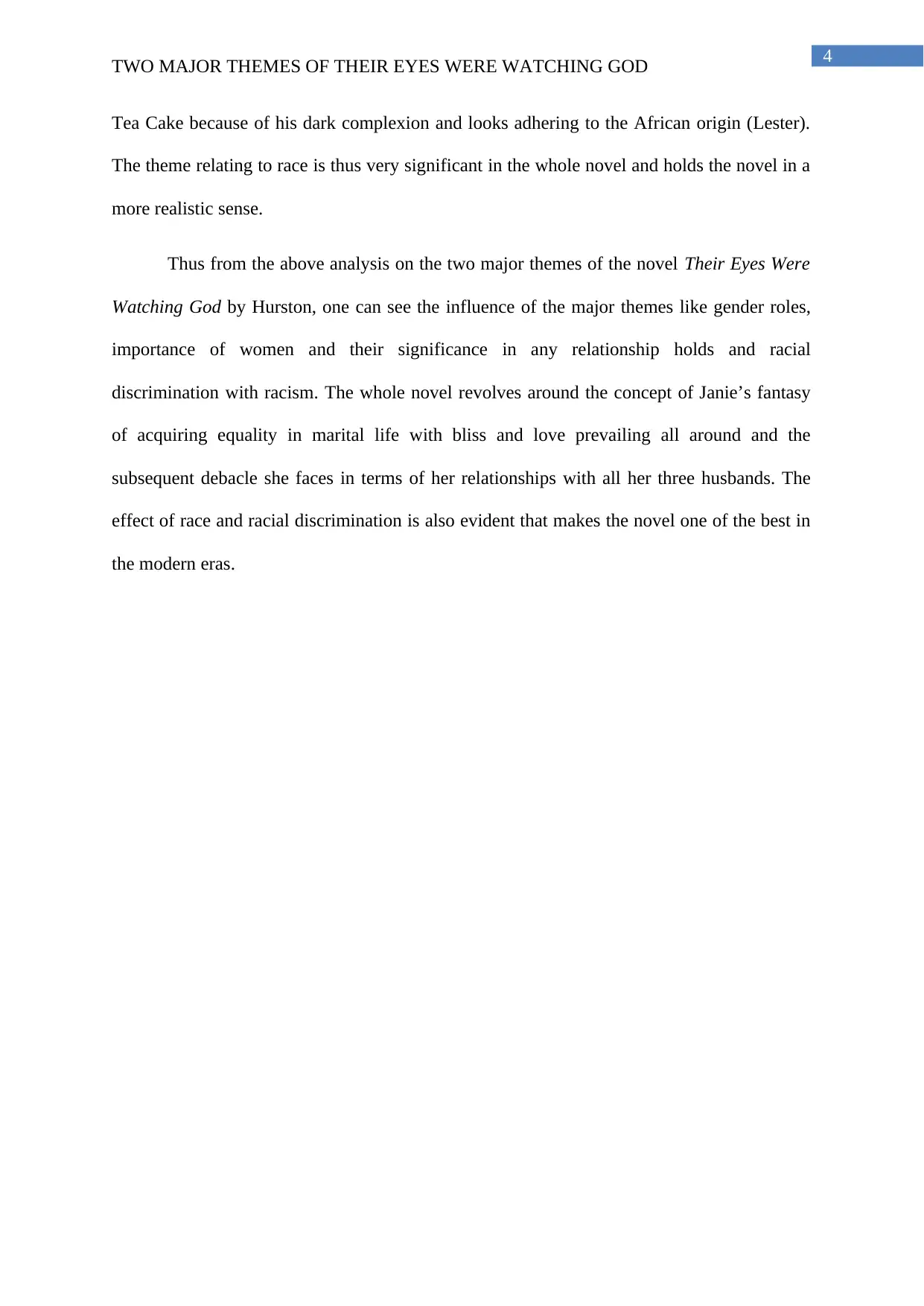
4
TWO MAJOR THEMES OF THEIR EYES WERE WATCHING GOD
Tea Cake because of his dark complexion and looks adhering to the African origin (Lester).
The theme relating to race is thus very significant in the whole novel and holds the novel in a
more realistic sense.
Thus from the above analysis on the two major themes of the novel Their Eyes Were
Watching God by Hurston, one can see the influence of the major themes like gender roles,
importance of women and their significance in any relationship holds and racial
discrimination with racism. The whole novel revolves around the concept of Janie’s fantasy
of acquiring equality in marital life with bliss and love prevailing all around and the
subsequent debacle she faces in terms of her relationships with all her three husbands. The
effect of race and racial discrimination is also evident that makes the novel one of the best in
the modern eras.
TWO MAJOR THEMES OF THEIR EYES WERE WATCHING GOD
Tea Cake because of his dark complexion and looks adhering to the African origin (Lester).
The theme relating to race is thus very significant in the whole novel and holds the novel in a
more realistic sense.
Thus from the above analysis on the two major themes of the novel Their Eyes Were
Watching God by Hurston, one can see the influence of the major themes like gender roles,
importance of women and their significance in any relationship holds and racial
discrimination with racism. The whole novel revolves around the concept of Janie’s fantasy
of acquiring equality in marital life with bliss and love prevailing all around and the
subsequent debacle she faces in terms of her relationships with all her three husbands. The
effect of race and racial discrimination is also evident that makes the novel one of the best in
the modern eras.
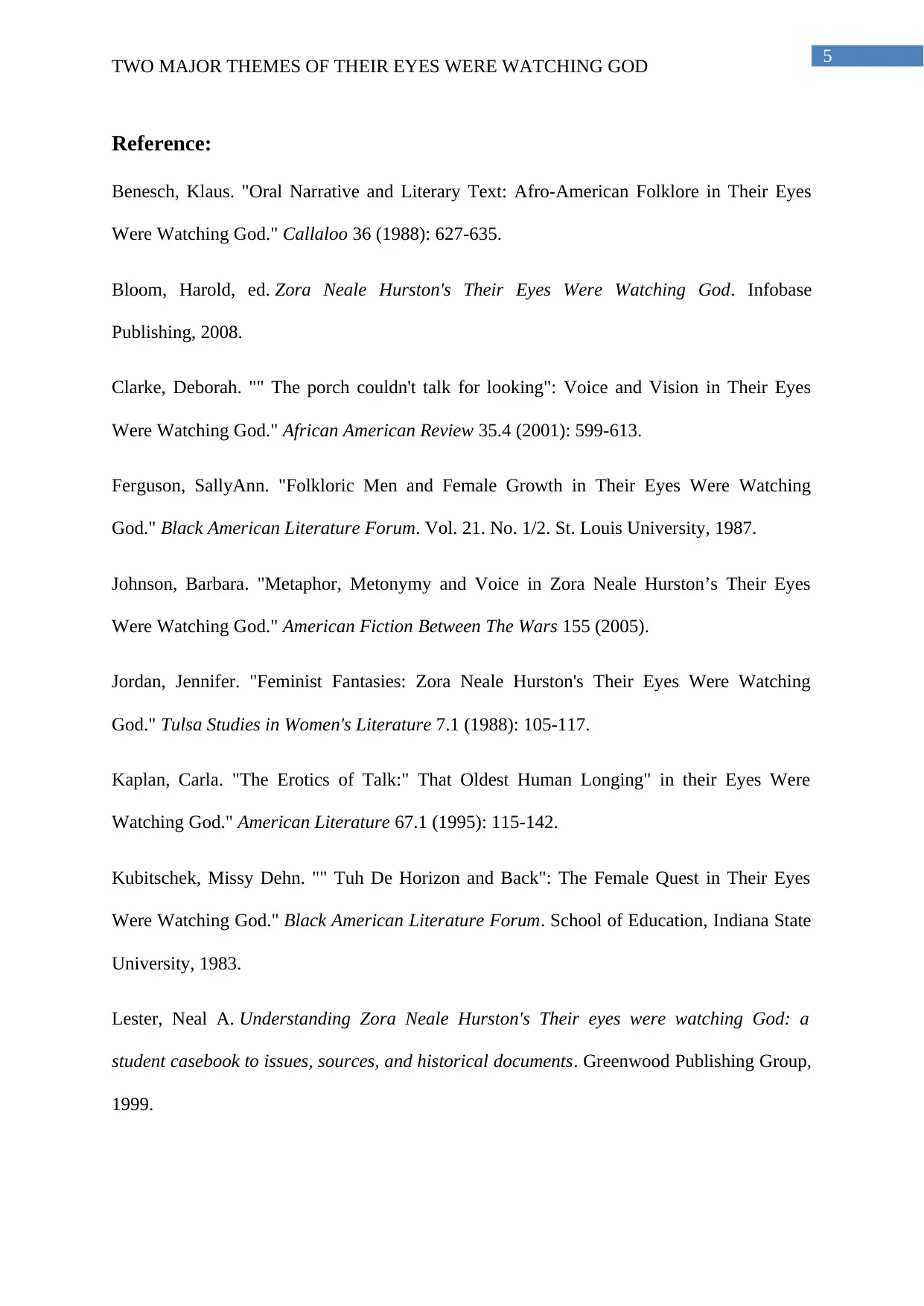
5
TWO MAJOR THEMES OF THEIR EYES WERE WATCHING GOD
Reference:
Benesch, Klaus. "Oral Narrative and Literary Text: Afro-American Folklore in Their Eyes
Were Watching God." Callaloo 36 (1988): 627-635.
Bloom, Harold, ed. Zora Neale Hurston's Their Eyes Were Watching God. Infobase
Publishing, 2008.
Clarke, Deborah. "" The porch couldn't talk for looking": Voice and Vision in Their Eyes
Were Watching God." African American Review 35.4 (2001): 599-613.
Ferguson, SallyAnn. "Folkloric Men and Female Growth in Their Eyes Were Watching
God." Black American Literature Forum. Vol. 21. No. 1/2. St. Louis University, 1987.
Johnson, Barbara. "Metaphor, Metonymy and Voice in Zora Neale Hurston’s Their Eyes
Were Watching God." American Fiction Between The Wars 155 (2005).
Jordan, Jennifer. "Feminist Fantasies: Zora Neale Hurston's Their Eyes Were Watching
God." Tulsa Studies in Women's Literature 7.1 (1988): 105-117.
Kaplan, Carla. "The Erotics of Talk:" That Oldest Human Longing" in their Eyes Were
Watching God." American Literature 67.1 (1995): 115-142.
Kubitschek, Missy Dehn. "" Tuh De Horizon and Back": The Female Quest in Their Eyes
Were Watching God." Black American Literature Forum. School of Education, Indiana State
University, 1983.
Lester, Neal A. Understanding Zora Neale Hurston's Their eyes were watching God: a
student casebook to issues, sources, and historical documents. Greenwood Publishing Group,
1999.
TWO MAJOR THEMES OF THEIR EYES WERE WATCHING GOD
Reference:
Benesch, Klaus. "Oral Narrative and Literary Text: Afro-American Folklore in Their Eyes
Were Watching God." Callaloo 36 (1988): 627-635.
Bloom, Harold, ed. Zora Neale Hurston's Their Eyes Were Watching God. Infobase
Publishing, 2008.
Clarke, Deborah. "" The porch couldn't talk for looking": Voice and Vision in Their Eyes
Were Watching God." African American Review 35.4 (2001): 599-613.
Ferguson, SallyAnn. "Folkloric Men and Female Growth in Their Eyes Were Watching
God." Black American Literature Forum. Vol. 21. No. 1/2. St. Louis University, 1987.
Johnson, Barbara. "Metaphor, Metonymy and Voice in Zora Neale Hurston’s Their Eyes
Were Watching God." American Fiction Between The Wars 155 (2005).
Jordan, Jennifer. "Feminist Fantasies: Zora Neale Hurston's Their Eyes Were Watching
God." Tulsa Studies in Women's Literature 7.1 (1988): 105-117.
Kaplan, Carla. "The Erotics of Talk:" That Oldest Human Longing" in their Eyes Were
Watching God." American Literature 67.1 (1995): 115-142.
Kubitschek, Missy Dehn. "" Tuh De Horizon and Back": The Female Quest in Their Eyes
Were Watching God." Black American Literature Forum. School of Education, Indiana State
University, 1983.
Lester, Neal A. Understanding Zora Neale Hurston's Their eyes were watching God: a
student casebook to issues, sources, and historical documents. Greenwood Publishing Group,
1999.

6
TWO MAJOR THEMES OF THEIR EYES WERE WATCHING GOD
Levecq, Christine. "" You Heard Her, You Ain't Blind": Subversive Shifts in Zora Neale
Hurston's Their Eyes Were Watching God." Tulsa Studies in Women's Literature 13.1 (1994):
87-111.
TWO MAJOR THEMES OF THEIR EYES WERE WATCHING GOD
Levecq, Christine. "" You Heard Her, You Ain't Blind": Subversive Shifts in Zora Neale
Hurston's Their Eyes Were Watching God." Tulsa Studies in Women's Literature 13.1 (1994):
87-111.
1 out of 7
Your All-in-One AI-Powered Toolkit for Academic Success.
+13062052269
info@desklib.com
Available 24*7 on WhatsApp / Email
![[object Object]](/_next/static/media/star-bottom.7253800d.svg)
Unlock your academic potential
© 2024 | Zucol Services PVT LTD | All rights reserved.


